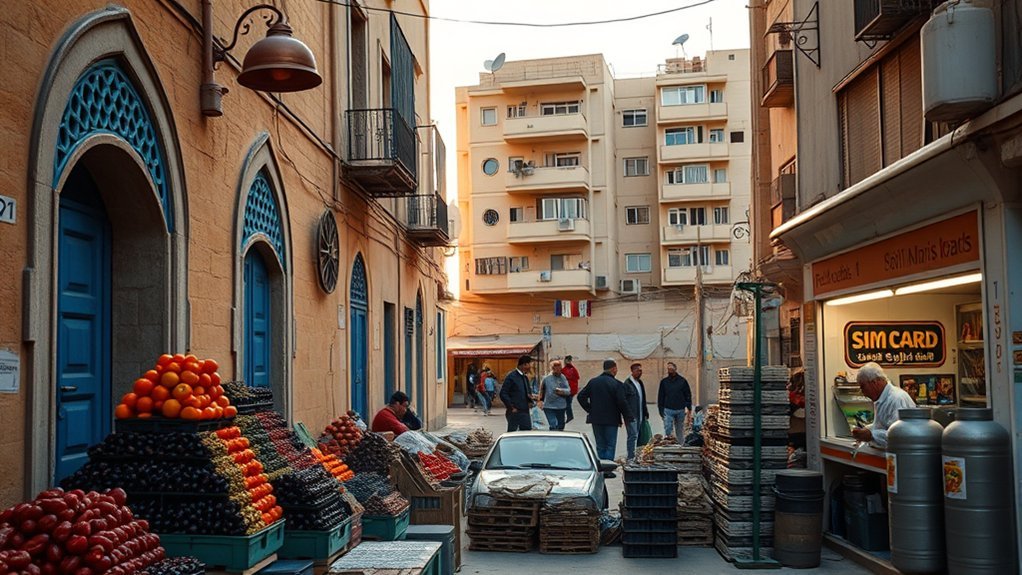You’ll find living in Libya is very cheap by international standards, but low wages mean you’ll likely need savings or extra income to fully cover costs. Basic monthly expenses (excluding rent) are about 308 LYD for a single person and 1,093 LYD for a family of four. Expect rent to be the biggest hit — a city-center one-bedroom averages ~1,233 LYD. Utilities and internet are modest; transit and food are inexpensive. Keep going to see detailed budget breakdowns and tips.
Overview of Living Costs and Key Statistics
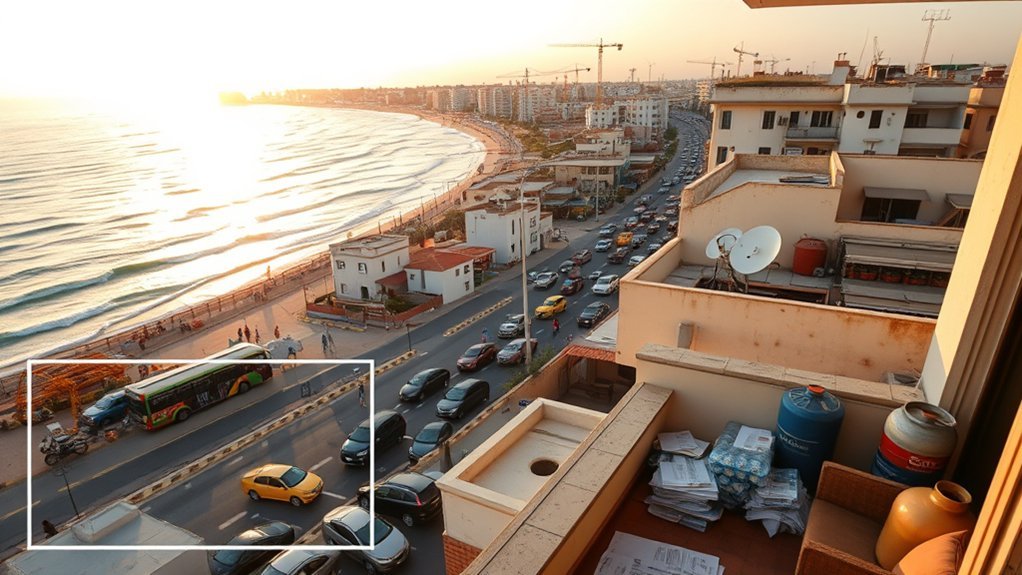
You’ll find Libya among the world’s cheapest countries to live in: the average monthly cost of living is about $404, placing it 194th of 197 countries, while the typical after-tax salary is roughly $295 — enough to cover only about 0.7 months of expenses.
For practical comparison, that gap means you’ll need supplemental income or savings to sustain basic needs. Key line items show low estimated monthly costs: utilities for a one-person household run about $16.90 and internet (50 Mbps+) is roughly $22.70.
Eating out remains affordable — a lunch averages $3.64 and a dinner for two about $15.20. Rent will shift your budget most; apartment prices vary by city and quality, so factor rent separately from those living costs.
Official family estimates list roughly 1,093.1 LYD (~$250) monthly excluding rent, underscoring that living in Libya is cheap nominally but constrained by low wages and rental exposure.
Typical Monthly Budgets for Individuals and Families
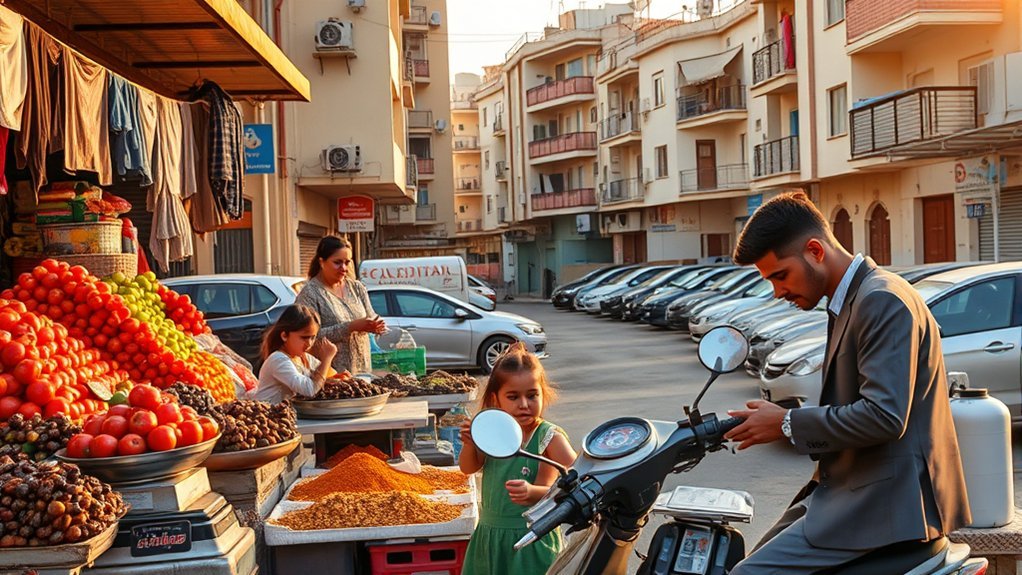
Because basic living costs are low but rent and wages vary, you’ll want to model budgets around two scenarios: single and family.
Using the data, your baseline monthly expenses (excluding rent) are about 308.3 LYD for a single and 1,093.1 LYD for a family of four. Compare those to the average rent: a 1-bedroom apartment in city center averages 1,233.33 LYD, while a 3-bedroom outside center is roughly 1,341.67 LYD — significant when you add monthly expenses.
With an average net salary near 1,700.00 LYD, a single person could cover living costs plus average rent for a small apartment in city if they prioritize spending; a family will need multiple earners or savings, since combined monthly obligations approach or exceed typical wages.
With average pay near 1,700 LYD, a single can manage city living; families will likely need extra earners or savings
Tripoli’s monthly living costs are about 76% lower than London’s, so while rent can dominate your budget, overall living remains comparatively affordable for expatriates and locals who plan carefully.
Housing, Utilities, and Internet Prices
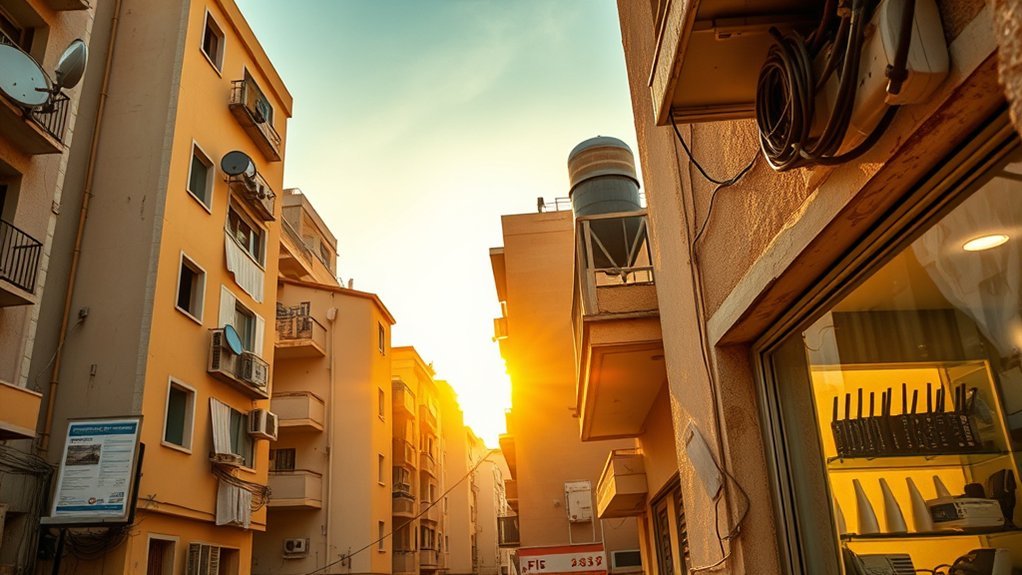
While rent can take up a big slice of your income, Libya’s housing and utilities remain affordable compared with many Western capitals: a 1‑bedroom in a city center averages about 1,233.33 LYD/month and a 3‑bed outside center around 1,341.67 LYD.
Basic utilities for an 85 m² flat run roughly 155.36 LYD/month, and a 60+ Mbps internet plan costs near 165.83 LYD—together these typical monthly housing-related expenses can approach or exceed half of the average net salary of 1,700.00 LYD, so plan accordingly.
You should evaluate trade‑offs between location and space, and budget for housing, utilities, apartment, internet as separate line items.
Typical monthly figures to compare:
- 1‑bedroom (city center): 1,233.33 LYD
- 3‑bedroom (outside center): 1,341.67 LYD
- Utilities (85 m²): 155.36 LYD
- Internet (60+ Mbps): 165.83 LYD
Use these numbers to model scenarios: central small apartment versus larger suburban unit.
If your net salary is 1,700 LYD, prioritize location or space based on commuting costs and lifestyle.
Food, Groceries, and Dining Out
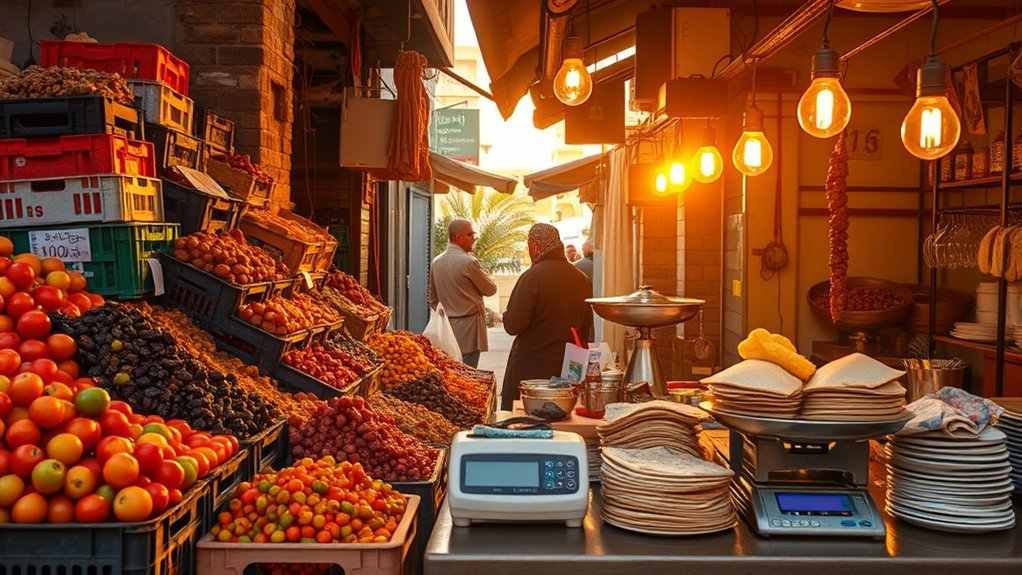
Food and dining in Libya are generally inexpensive, so you can stretch your budget whether you cook at home or eat out. You’ll find dining out cost-effective: a lunch menu averages $3.64, fast-food combos about $3.41, and a dinner for two roughly $15.20.
Drinks are cheap too—a 0.5L domestic beer costs $0.62 and a cappuccino $0.54—so casual nights out won’t blow your plan.
Groceries follow the same pattern: staple items remain low-priced (milk 1L ≈ $0.95, a dozen eggs ≈ $1.30), letting you save by preparing meals at home.
For planning, estimated monthly food expenses for a family of four are about 1,093.1 LYD (7,898.6 LD), excluding rent, which helps you compare with housing costs previously discussed.
Use these benchmarks to decide when to buy groceries versus dining out; overall, food and groceries present strong value if you monitor per-meal and monthly cost metrics.
Transportation, Childcare, and Other Expenses
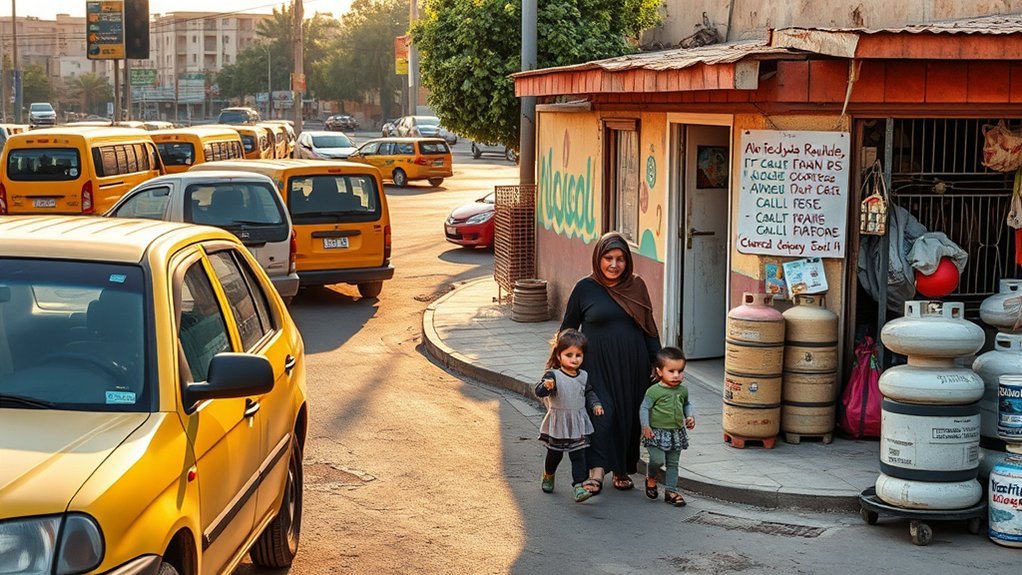
Alongside cheap meals, getting around and covering day-to-day services in Libya stays affordable compared with many countries.
Alongside inexpensive meals, transport and everyday services in Libya remain notably affordable compared with many other countries.
You’ll find transportation, childcare, expenses, and utilities add up far less than in Western cities. Public transport one-way is about 1.50 LYD and a monthly pass runs near 118.00 LYD, while an 8 km taxi averages 8.58 LYD. Gasoline is extremely cheap at ~0.15 LYD per liter, reducing car-running costs.
- Public transit: 1.50 LYD one-way; monthly pass ~118.00 LYD — good value if you commute regularly.
- Taxis & fuel: 8.58 LYD for an 8 km ride; fuel ~0.15 LYD/L — taxis and driving are economical.
- Childcare: private preschool averages 49.00 LYD vs. 1,387.27 LYD in the U.S. — massive savings on childcare.
- Utilities: basic for an 85 m² apartment ~155.36 LYD/month — affordable core household expenses.
Frequently Asked Questions
Is Libya Cheap to Live?
Yes — you’ll find Libya cheap to live in: cost factors like low housing prices, modest transportation expenses, and inexpensive daily necessities keep monthly spending low, so you’ll save compared with many countries while balancing local market variability.
Can an American Live in Libya?
Yes — you can live in Libya, but you’ll need appropriate visa requirements, manage cultural adaptation, assess safety concerns, and connect with an expat community; compare costs, income prospects, and risks practically before relocating.
What Is a Good Salary in Libya?
Don’t worry about low averages—aim for about $1,700 monthly as a good salary in Libya. That beats the average salary, improves expatriate experience, aids cost comparison, and reflects stronger job opportunities and practical living.
How Much Is a Meal in Libya?
A meal in Libya typically costs $3–$15; you’ll find meal prices vary by dining options. Use restaurant reviews to compare local cuisine affordability, practical costs for fast food, cafes, and mid-range dinners.
Conclusion
In Libya, you’ll find costs that, while gentler than some Western cities, still demand careful planning. Compared to regional peers, housing and utilities are relatively modest, but imported goods and private services can quietly add up. For a single person expect a leaner budget; families will need cushioning for education, healthcare, and transport. Use local markets and shared housing to stretch money further, and monitor currency and supply shifts to avoid sudden financial surprises.

